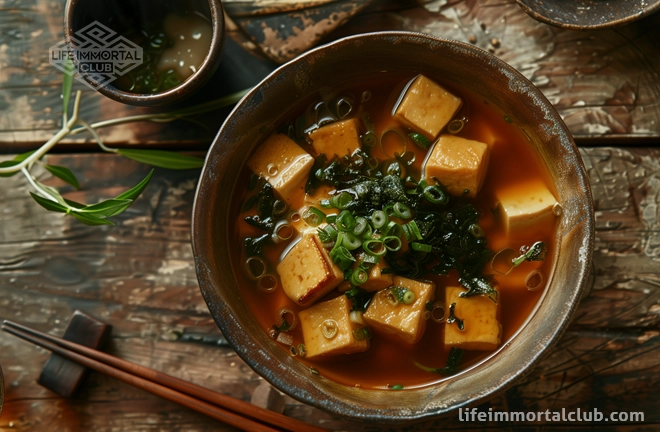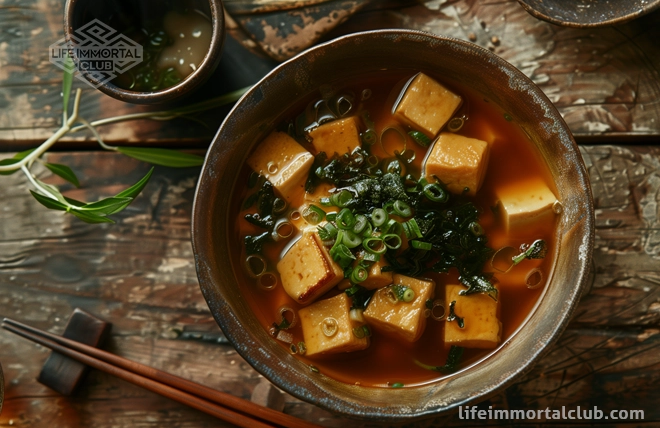Enhance Your Meals Using MISO and Get Bonus Longevity Benefits.

Ah, the miso; this magic paste, if you will, like my kitchen has been turned into a mini culinary dojo. Miso, my story doesn't begin amidst the bustle of any old Tokyo street, no—introduction to the stuff came rather humbly, in fact: in the aisles of my local grocer. Love at first bite —or sip in my case from a savory soup. This is no ordinary soybean paste, which has gone through the fermentation process; this is your entry ticket to flavortown and also a passport to a good deal of benefits for your health.
I was actually kind of on a mission, and I was looking for something that may very well be able to, in a way, liven my dinners up a bit without having my diet scream, 'Bland health food.' at every turn. Enter miso, stage left, with its rich umami flavor that could make even cardboard taste gourmet (not that I've tried). But the real kicker? Miso is that friend who's always got your back—always—packed with nutrients, and damn right, it's got your back in the health department.
I mean, who knew that the path to flavor was going to put me down this road bordered by digestive health benefits, immune support, and doses of probiotics that make my gut happier than a kid in a candy store? Though I'm certainly not one to claim longevity expertise, the word on the street is that I've heard the whispering in the wind speak to miso being a staple in "Blue Zone" diets, places where people forget to stop living and clock out past their century mark.
But, before you go off thinking of me as some sort of superhero wielding miso to do battle against bad restaurant food (although that really does sound quite cool), be assured that I'm just a regular health concious lady, doing my thing and living well. To dive into that rich umami world of miso and know how such a humble paste can turn meals and health around—one spoonful at a time. And who knows? Maybe by the end of this journey, you'll be as miso-smitten as I am.
Health Benefits of Miso
Source of Minerals and Vitamins: Miso, a paste made from fermented soybeans, sea salt, and koji mushroom, is highly nutritious. According to longevity expert Dr. Vicente Mera, it offers an immense source of minerals and vitamins, making it a significant superfood.
Reduction in Disease Incidences: A Japanese study highlights that regular miso consumption is associated with lower incidences of stomach cancer and heart disease. Miso also demonstrates anti-diabetic and anti-inflammatory effects on the body.
Probiotic Benefits: Being a fermented food, miso naturally acts as a probiotic. It supports the natural balance of intestinal flora, crucial for maintaining general health.
Fermented foods have been a staple in human diets for thousands of years, offering not just preservation benefits but also numerous health advantages.
Here's an overview of the health benefits associated with consuming fermented foods:
Enhanced Digestive Health: Fermented foods are rich in probiotics, beneficial bacteria that play a crucial role in maintaining gut health. They can help balance the gut microbiota, which is essential for proper digestion, absorption of nutrients, and elimination of toxins.
Boosted Immune System: A significant portion of the immune system is located in the gut. By improving gut health, probiotics from fermented foods can enhance immune function, potentially reducing the incidence of infections and inflammation.
Improved Nutrient Absorption: The fermentation process can increase the bioavailability of nutrients, making it easier for the body to absorb vitamins and minerals from food. This is particularly true for B vitamins, including folate and riboflavin.
Mental Health Benefits: Emerging research suggests a link between gut health and mental health, often referred to as the "gut-brain axis." Probiotics from fermented foods may contribute to improved mental health outcomes, including reduced symptoms of anxiety and depression.
Weight Management: Some studies suggest that a healthy gut microbiota, supported by the consumption of probiotics, can play a role in maintaining a healthy weight. Fermented foods might help regulate appetite and reduce food intake.
Reduced Risk of Chronic Diseases: Regular consumption of fermented foods has been associated with a lower risk of several chronic conditions, including heart disease, diabetes, and certain cancers. This may be due to their anti-inflammatory properties and the role of a healthy gut microbiome in overall health.
Lactose Digestion: Fermented dairy products, like yogurt and kefir, break down lactose into lactic acid, making these foods more digestible for individuals with lactose intolerance.
Preservation of Food: Beyond health benefits, fermentation is a natural way to preserve food. This process inhibits the growth of harmful bacteria, thereby extending the shelf life of foods without the need for artificial preservatives.
It's worth noting that the health benefits of fermented foods can vary depending on the type of food, the strains of bacteria involved in the fermentation process, and the individual consuming them. Incorporating a variety of fermented foods into the diet can provide a wide range of probiotics and nutrients.
Nutritional Analysis of Miso
- Proteins: Miso is a good source of proteins, essential for muscle repair and growth. The fermentation process may also enhance the bioavailability of amino acids.
- Vitamins: It contains vitamins, particularly B vitamins (such as B2, B3, B5, and B6), which are crucial for energy production and brain health. Vitamin K, important for blood clotting and bone health, is also present.
- Minerals: Miso is rich in minerals like zinc, which supports immune function; manganese, involved in bone formation and antioxidant defenses; and copper, important for heart health. It also contains calcium and iron, although the absorption of these minerals may be influenced by other components in miso.
- Fiber: The soybeans in miso provide dietary fiber, which is beneficial for digestive health and can help maintain a healthy gut microbiome
- Probiotics: As a fermented food, miso is a source of probiotics, beneficial bacteria that support gut health and may enhance immune function.
- Sodium: One of the notable considerations with miso is its high sodium content, which can be a concern for individuals with hypertension or those monitoring their salt intake. However, the impact of miso's sodium on health might differ from that of regular salt due to its complex nutritional profile and fermentation process.
- Isoflavones: Miso contains isoflavones, plant compounds that can act as antioxidants and may have beneficial effects on hormone regulation, particularly estrogen. This can be relevant for reducing the risk of certain cancers and supporting bone health.
- Fatty Acids: While not a significant source of fat, miso does contain small amounts of healthy fats, including essential fatty acids that are important for heart and brain health.
It's important to note that the specific nutritional content of miso can vary depending on the type (e.g., white, yellow, red, or black miso) and the brand, due to differences in ingredients and fermentation processes.
How to Incorporate Miso into Your Diet
In Japan, miso soup is a staple, consumed daily, especially in the morning. It's known for its direct effects on aging, particularly visible on the skin and cognitive functions. Beyond the traditional miso soup, which includes tofu and seaweed, miso can be easily incorporated into various dishes. Dr. Mar Mira suggests preparing it with hot water, tofu, seaweed, spring onion, or leek to create a meal rich in lactobacillus and bifidus bacteria.
Miso stands out not just for its health benefits but also for its affordability and delicious taste, making it easy to combine with vegetables for enhanced dishes. Here are some varied ways to add it in to your daily meals to add flavor and pack a nutritional punch!
- Start with Miso Soup, Like they do in Japan: The simplest way to incorporate miso is through miso soup. You can have it as a starter, a snack, or even a light breakfast. The traditional miso soup includes tofu, seaweed, and spring onions, offering a good balance of protein, minerals, and vitamins.
- Use as a Seasoning or Marinade: Miso paste can be an excellent seasoning for various dishes. Use it to marinate fish, chicken, or vegetables before cooking to add depth and umami flavor. This not only boosts the taste but also the nutritional value of your meals.
- Add to Salad Dressings: Enhance your salads by incorporating miso into the dressings. Mix miso paste with ingredients like olive oil, vinegar, and a hint of honey to create a rich, flavorful dressing that adds probiotics and nutrients to your fresh vegetables.
- Incorporate into Sauces: Miso can be blended into sauces for pasta, grains, or vegetables. Its rich umami flavor complements creamy or tomato-based sauces, adding a unique twist to your favorite dishes.
- Use in Vegetable Dishes: Stir a small amount of miso paste into sautéed or roasted vegetables to elevate their flavor. This not only makes your vegetables more appealing but also increases your intake of healthy fermented foods.
- Mind the Sodium Content: While miso offers various health benefits, it's also high in sodium. If you're watching your salt intake, use miso judiciously and consider it as part of your overall daily sodium consumption.
- Balance with Other Ingredients: Balance your use of miso with other low-sodium and nutrient-rich foods. Incorporate plenty of fresh vegetables, fruits, whole grains, and lean proteins into your diet alongside miso to ensure a well-rounded nutritional intake.
- Experiment with Different Type: Explore the different types of miso (white, yellow, red, black) to enjoy a range of flavors and health benefits. Each type has a distinct taste and can be used in various dishes, allowing for diversity in your diet.
- Moderation is Key: As with any food, moderation is essential. Enjoy miso as part of a diverse and balanced diet to maximize its health benefits without overdoing it, especially considering its sodium content.
By thoughtfully incorporating miso into your diet, you can enjoy its rich flavors while also taking advantage of its nutritional benefits.





